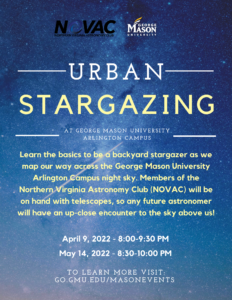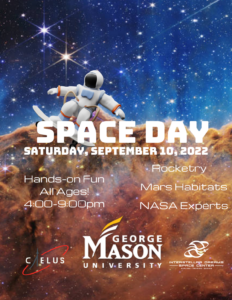Public Night @ Sky Meadows – Check http://www.novac.com/wp/observing/sky-meadows/ for site details and directions.
NOTE: There is no admittance to Sky Meadows State Park after 6:30pm! Even if the event goes later.
The Quadrantids meteor shower can yield as many as 40 meteors per hour, radiating from the constellation Bootes. Visibility will be reduced on account of a bright second quarter Moon, but you may be able to spot a few during the night… Begin the new year by looking up!
Jupiter is sure to delight all who view it, from professional observatories to amateurs with handheld binoculars. Make sure to check out its four Galilean moons and see if you can make out colorful cloud bands or the Great Red Spot. If you’ve ever considered dabbling in planetary imaging, tonight (adjacent to a dark new moon) would be the perfect night to start!
Smack dab on the new moon, this promises to be nice dark viewing. These shooting stars are composed of the remnants of Comet Halley. Meteors—up to 30 per hour in the Northern Hemisphere and 60 per hour in the Southern—will appear to radiate from Aquarius.
The Quadrantids meteor shower can yield as many as 40 meteors per hour, radiating from the constellation Bootes. It peaks this year on the night of the 3rd and morning of the 4th. The first quarter moon will set shortly after midnight leaving fairly dark skies for what could be a good show. Best viewing will be from a dark location after midnight. Begin the new year by looking up!
The Leonids is an average shower, producing up to 15 meteors per hour at its peak. This shower is unique in that it has a cyclonic peak about every 33 years where hundreds of meteors per hour can be seen. That last of these occurred in 2001. The Leonids is produced by dust grains left behind by comet Tempel-Tuttle, which was discovered in 1865. The shower runs annually from November 6-30. It peaks this year on the night of the 17th and morning of the 18th. The nearly new moon will not be a problem this year. Skies should be dark enough for what should be good show. Best viewing will be from a dark location after midnight. Meteors will radiate from the constellation Leo, but can appear anywhere in the sky.
The Quadrantids meteor shower can yield as many as 40 meteors per hour, radiating from the constellation Bootes. It peaks this year on the night of the 3rd and morning of the 4th. Bummer though: this will occur during a nearly full moon, so all but the brightest meteors will be washed out. Still, looking up at the sky isn’t a bad way to start the new year!

RSVP here.
Members of the public are invited to view the urban night sky over George Mason University’s Arlington Campus through the telescopes of NOVAC volunteers.
Observing will take place on the outdoor plaza in front of Van Metre Hall (Schar School of Policy and Government). Visitor Parking is available in the Van Metre Hall Garage (hourly rate). There is also metered street parking around the campus.
As a reminder please ask permission from the telescope owner before using. Please monitor your children if they’re around expensive astronomical equipment.
Don’t forget to dress warmly. Please check the weather forecast.
Note: This outdoor event is weather-dependent and may be cancelled because of significant cloud cover or precipitation.

THIS EVENT IS CANCELED AND WILL BE RESCHEDULED FOR LATER THIS SUMMER.
RSVP here.
Members of the public are invited to view the urban night sky over George Mason University’s Arlington Campus through the telescopes of NOVAC volunteers.
Observing will take place on the outdoor plaza in front of Van Metre Hall (Schar School of Policy and Government). Visitor Parking is available in the Van Metre Hall Garage (hourly rate). There is also metered street parking around the campus.
As a reminder please ask permission from the telescope owner before using. Please monitor your children if they’re around expensive astronomical equipment.
Don’t forget to dress warmly. Please check the weather forecast.
Note: This outdoor event is weather-dependent and may be cancelled because of significant cloud cover or precipitation.


